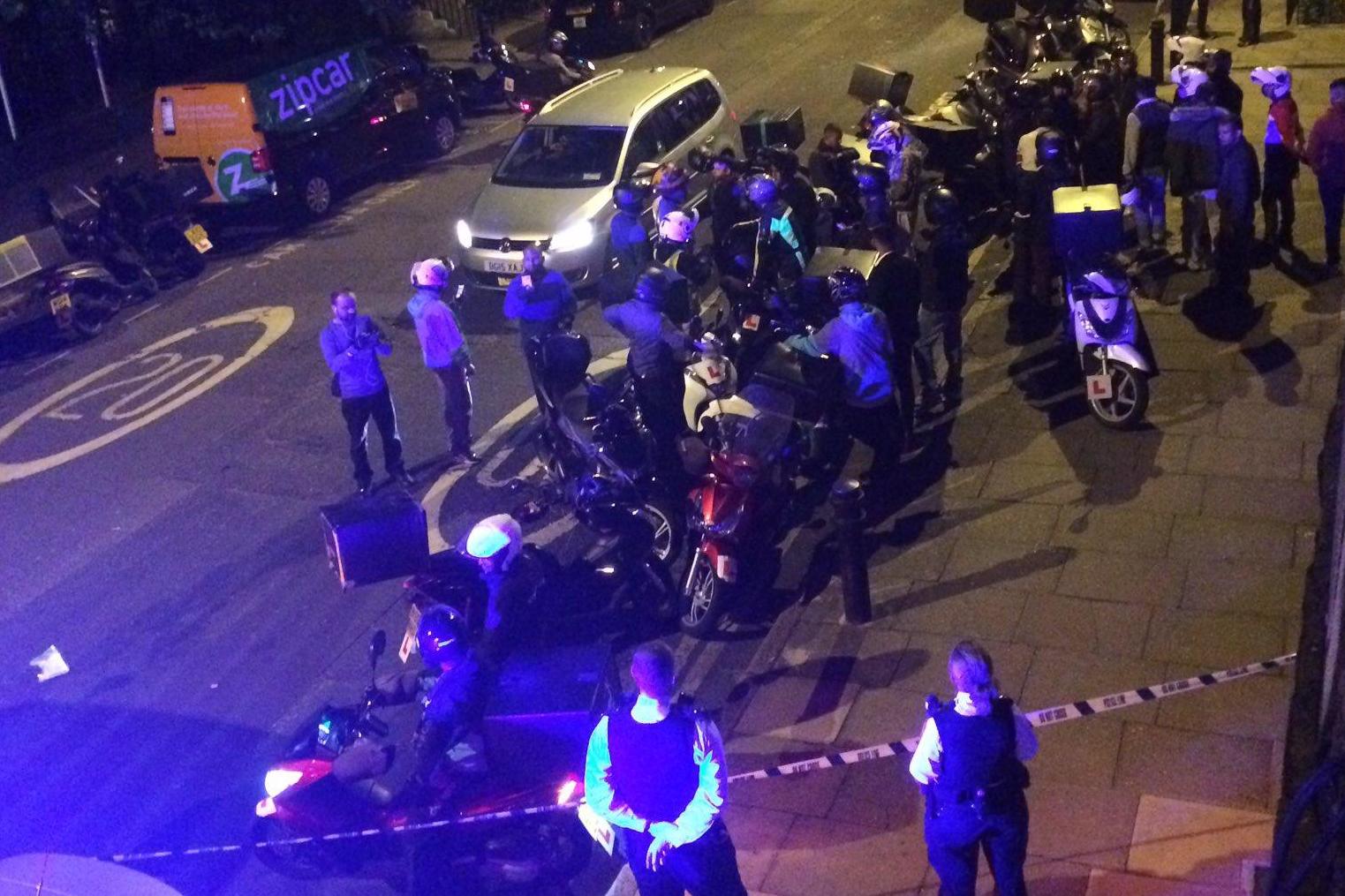Enhanced stop and search powers proposed to target acid, drones and laser pointers
Planned legal changes would expand the reasons for carrying out stop and searches

People suspected of carrying acid in a public place “without good reason” will be stopped and searched under enhanced powers proposed by the government.
A public consultation has been launched on new laws to allow officers to target corrosive substances, drones and laser pointers as crime patterns shift.
Scientists at the Defence Science and Technology Laboratory at Porton Down are also developing a portable kit to allow police to test suspected corrosive substances on the street.
An unsuccessful trial previously saw litmus paper used and police leaders have warned of the difficulty identifying acid that is frequently disguised in soft drink bottles.
The UK currently has one of the highest rates of recorded acid attacks of any country in the world, which have so far led to two deaths and left many more victims with life-changing injuries.
Existing powers allow police officers to stop and search people if they are suspected of possessing a corrosive substance with the “intent of causing injury”.
The proposed change to the law will enable them to search anyone carrying acid in public without good reason, which was also made a criminal offence in the Offensive Weapons Bill.
Ministers say the move – first mooted as part of a blueprint to tackle serious violence earlier this year – will enable forces to take better preventative action.
Nick Hurd, the policing minister, said: “Acid attacks are appalling acts of violence that devastate lives and can have fatal consequences.
“A bottle of acid can be as lethal as a knife or a firearm, and these new powers will enable police officers to prevent these despicable thugs from carrying out their terrible crimes.
“The home secretary has been clear that stop and search is a vital and effective policing tool when used correctly. We will always seek to give police the powers they need to crack down on violent crime and bring perpetrators to justice.”
Assistant chief constable Rachel Kearton, the National Police Chiefs’ Council lead for acid attacks, said the crime was “particularly abhorrent”.
“Tackling the scourge of acid attacks requires a coordinated approach across a number of different organisations and sectors,” she added.
“Stop and search is ultimately a safeguarding power – we use it to prevent crime, identify those who intend to cause harm and disrupt serious and organised crime networks.
“Officers should be confident to use stop and search – proportionately and respectfully – because it’s an important investigative tool.”
The government is also consulting on expanded stop and search powers to tackle the increasing misuse of drones and laser pointers.
The number of incidents of drones coming close to manned aircraft rose to 93 in 2017, and they are seen as a security threat to critical national infrastructure, public places, large events, military bases and other sensitive sites.
The proposals would extend stop and search laws to cover suspected crimes under the Air Navigation Order 2016 and Prisons Act 1952, to combat the rising use of drones to smuggle drugs and other contraband into prisons.
The misuse of laser pointers against vehicles is also a growing concern, and “dazzling or distracting” someone in control of a vehicle has been made a crime.
Since 2010, there have been more that 1,000 incidents of lasers being pointed at aircraft reported to the Civil Aviation Authority.
The government is proposing extending stop and search powers to cover offences under the Laser Misuse (Vehicle) Act 2018 to enable more effective enforcement and target people intent on causing harm.
Mark Swan, director of the UK Civil Aviation Authority, said: “Illegally-used drones and lasers are a very real safety risk to aircraft, particularly during critical phases of flight, such as takeoff and landing.
“Laws are now in place to protect aircraft from both drones and laser pointers, and we support efforts by the police to enforce these laws.”
The use of stop and search fell in England and Wales from a peak of 1.5 million in 2008-09 to almost 304,000 in 2016-17 – the lowest number since current data records began 16 years ago.
Some senior officers have drawn a link between the dramatic decline and rising violent crime, saying criminals feel emboldened to carry guns and knives in the belief they will not be detected.
They say constables have become reluctant to use the measure because they fear racism accusations in the wake of showing black people were being disproportionately targeted.
Theresa May reformed stop and search as home secretary in 2014, saying the law was being “misapplied” following damning statistics showing racial disparities.
In 2016-17, people from black and minority ethnic groups were just under four times as likely to be stopped and searched compared with white people.
A watchdog found that 94 per cent of examined incidents had “reasonable grounds” or resulted in objects including drugs, weapons, stolen goods or evidence of other crimes being found.
But a HM Inspectorate of Constabulary report released in December warned that searches of black, Asian and ethnic minority people were still disproportionate and threatening public trust and confidence in the police.
The watchdog said police forces have not sufficiently explained the disparity, which suggests “that the use of stop and search on black people might be based on weaker grounds for suspicion than its use on white people”.
